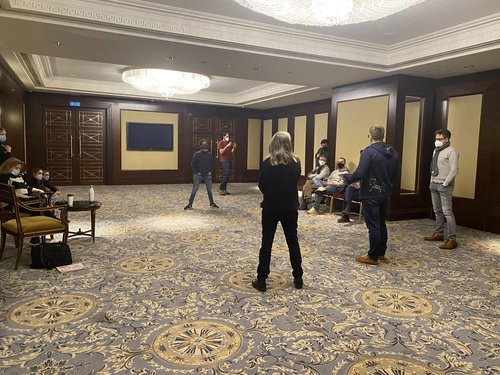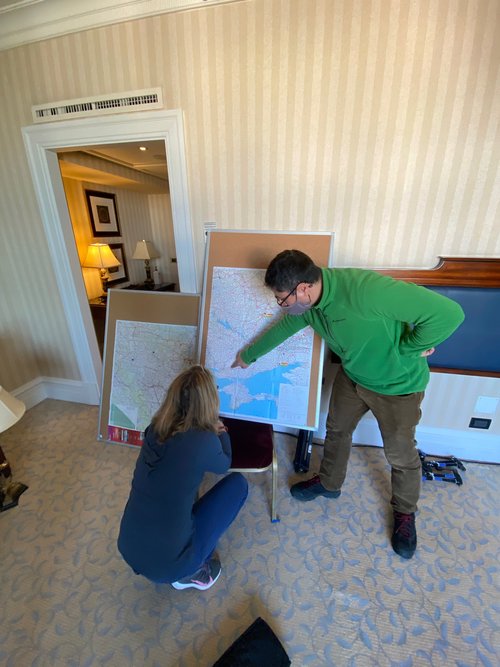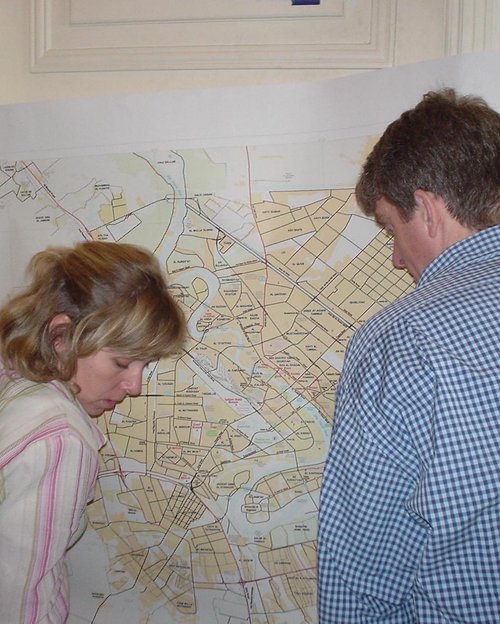NBCU Academy Presents “Behind the Story”

As tensions continue to rise in and around Ukraine, NBC News has deployed producers, correspondents, newsgathering crews and technical staff to the country to report on the escalating crisis. Andy Eckardt, NBC News’ deputy editor of Europe, and Sue Kroll, NBC News’ senior coordinating producer, talked with NBCU Academy about safety, getting the story right and how to keep morale up in a tense environment.
Special thanks to Aaron Sasson, Jonathan Mossek, Matt Bradley, Sean Keane and Shira Pinson for contributing footage to this lesson and to the rest of the Ukraine coverage team for keeping NBC News’ viewers informed.
Watch our video lesson above and read more of their extended Behind the Story conversation below.
How has Covid-19 complicated coverage in Ukraine?

Sue Kroll looking at a map of Ukraine with producer Mo Abbas, 2022. (Photo by Matt Bradley.)
Kroll: Covid has added a whole other layer in this environment. While we’ve been here, we’ve had a couple of colleagues that have had Covid. But then the other layer of Covid, which I have found to be really difficult, is the communication.
Eckardt: In normal times, we would all be sitting together in one room, on the phones on the computers. We don’t do that at the moment, we try to socially distance as much as possible, and often work from our hotel rooms and then just communicate by teams sometimes or phone.
Kroll: I feel like it’s a game of telephone, like somebody says, “Oh, can you do this,” and then I have to ask someone else, and then they ask someone else. And it just makes communication a lot harder. And it actually just takes a lot more time. I was here for 10 days before I actually realized, “Oh, my goodness, this is not working,” which is why I started to put us all on the same floor.
What’s your advice to folks who are interested in following in your footsteps?
Eckardt: I think it’s very important to expand your horizon as early as possible, get the experience of news environments and natural environments. This is how we all started and how we all work. Nobody taught us this in school, a lot of the things that we do these days really do come from experience. I’ve been 28 years with the company and I’m still learning every day, and I’m learning from my colleagues.

If you want to go to other countries, learn languages. That has always been a very, very important benefit, that I speak English well and speak my native German. That already gave me two languages to work with and really formed a lot in my professional life.
Kroll: I would say tips for people that are young who want to go into this business is that you have to be all-in. You really have to want it because a whole lot of people want to be doing this as well. So you’re going to have to work your rear end off. Raise your hand and actually follow through and do it be willing to work. Do it with a smile on your face but work hard. Listen to what people are talking about. Listen to the people that around you and what they’re talking about. And already be working on that task before anybody ever even asked you to do that task.
Don’t ever think that some job is below you. I still get coffee for people, I still log tapes. I still do whatever it is that needs to be done. I often joke, and I’ve done it several times while we’ve been here, “Is this really what I went to college for?” as I’m digging through some suitcase, but somebody’s got to do it. And it’s going to be me or one of us. There’s nothing below you.



